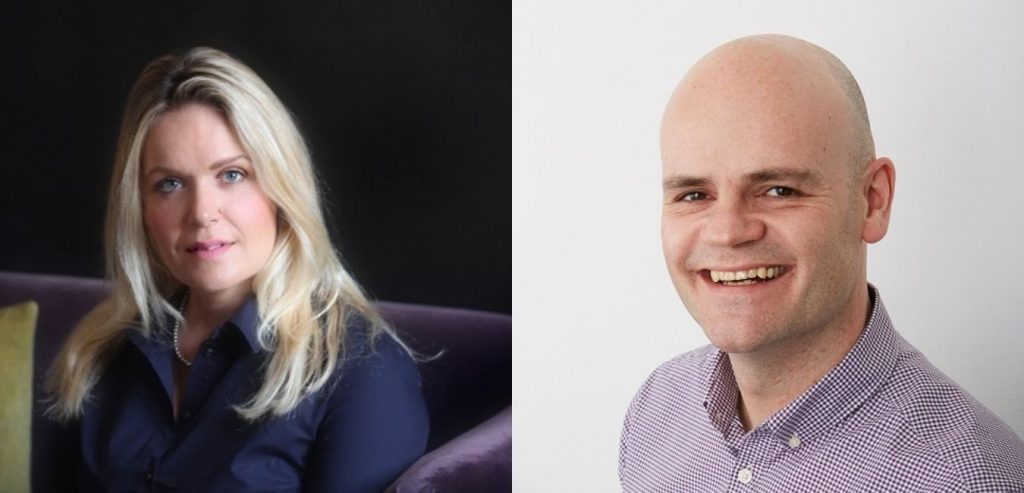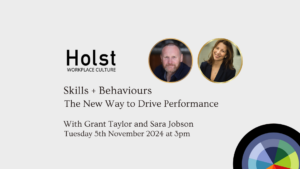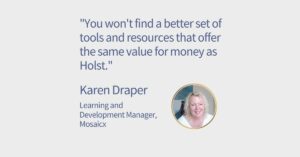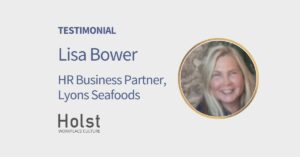As we approach the anniversary of the first UK lockdown, Holst's MD, Jo Emmerson and Chair, Iain Chalmers look back on what was a turbulent twelve months.
It’s almost a year to the day that the Holst team left our office and moved to remote working. The official work from home order didn’t come into force until a week later, but senior leaders Jo and Iain took the decision to go early and be prepared. A decision which stood us in good stead for a seamless transition.
In this Q&A, Iain and Jo look back on a turbulent twelve months. They talk about the challenges the business faced, the difficult decisions, but also the positive outcomes that we have all worked so hard to achieve. Read on for insights from the Holst leaders who set the workplace tone for Team Holst.
What were your expectations when we went into the first lockdown a year ago?
Jo: It was difficult to predict what would happen. With no warning we had to prepare for the worst, which was challenging but ultimately is what we had to do.
Iain: There was no clarity at all about what would happen to the economy. My initial expectation for Q2 was that the economy could completely grind to a halt and I honestly felt that the majority of our client base would put a budget freeze in place.
How did those expectations pan out? Was the reality for Holst better than you expected, or worse?
Jo: We are thankful the situation was better than anticipated. Outperforming our best case scenario was a big and very welcome surprise.
Iain: Thankfully, far better. Our clients were more stable than anticipated and we put in place a budget that allowed us to plan for multiple scenarios. In the end, we outperformed our best case scenario.
What was the most difficult decision you had to make?
Jo: The furlough situation gave with one hand (for which we were very grateful) but equally took with the other, as we were left with a skeleton staff. Those furloughed couldn’t contribute and this was frustrating from both sides. It’s hard to watch someone take on more responsibility and be powerless to help.
We definitely saw our resilience as an organisation build during this period along with an increased respect for each other, the business and its importance to us all.
Iain: It is always people. With the complete lack of clarity over what state the economy would be in, we had to make extremely difficult decisions. This wasn’t just about redundancies but also which members of the team should be on the Job Retention Scheme.
Although we were very grateful for the support the government provided to business, I don’t think the furlough scheme was structured correctly for those on it. Furloughed employees were not allowed to work which meant they were in lockdown without purpose. At the same time, the business was unable to use those employees to generate value for the economy. It seemed like a double blow to me.
In other countries, if the business’s revenue had dropped by more than 30% the government provided support to support the business and employees. The employees continued to work which helped the business, the employee’s mental health and the overall economy.
Iain specifically, did your experience of rebuilding Holst after the financial crash of 2008/9 help as we went into the first lockdown? What are the similarities, what are the differences?
Iain: Yes, the experience absolutely helped. In Q1 2009 our revenue dropped by over 50% and it happened very quickly. I knew that this crisis was going to be worse so we had to plan for multiple scenarios.
The speed in which the economy ‘fell off a cliff’ was similar and the word ‘unprecedented’ was bandied around quite a bit. But most things were different. In 2020 the size of the GDP change was enormous and obviously the physical restrictions made it extremely difficult to work. But technology is at a place that businesses could continue to operate. I don’t know what would have happened if a pandemic had hit in 2009.
Jo, how did Iain's experience of rebuilding a business helped you as you ran Holst without a full team for several months?
Jo: Iain’s experience undoubtedly helped with both planning and execution of our strategy. Our approach helped us to adapt quickly and we were in fact ahead of the curve with our training workshops as we already offered a mixed delivery of online and classroom training.
We evaluated all of our processes using a strategic wave analysis to predict what change and adaptation the business required over the next 18 months to enable the business to both survive and thrive.
What have you learnt as senior leader from the last 12 months? What would you do differently? What do you feel went well?
Jo: Difficult decisions are tough, particularly where people are involved. Listening is really important, creating a collaborative working environment where everyone can speak freely and their concerns and challenges can be understood. Being honest and transparent with the people who work for you helps because it enables you to help them understand what the business is trying to achieve and why those difficult decisions have to be made.
Iain: I’ve learnt that there is a solution to everything as long as you ‘face the brutal facts’ as Jim Collins would put it. You have to be honest with the situation and look for indicators from the market, your network and your clients.
I think we were fiscally responsible and acted with the right amount of pace even though the decisions were extremely tough.
Despite the hardship & sadness of the last 12 months, has Covid forced change at Holst that you feel is positive, and that would not have happened otherwise?
Jo: We have successfully streamlined our processes to enable us to be more efficient and effective. We have also created very close working relationships with our clients, prioritising value and service to support them through this challenging time. We all feel excited and positive about the future. A new office and a new way of working gives us a great opportunity to build a business that truly meets the needs of our customers.
Iain: I think every crisis brings a certain amount of positive change. I felt we were a stronger business in 2010 after the financial crisis and I feel the same in 2021. It has been tough for everyone at Holst but I think we are a closer team as a result. I think changes like moving offices, our reliance on technology to automate processes and a new ‘work from anywhere’ culture would have taken longer to implement without the Covid crisis.
And finally. what are you most looking forward to in the next twelve months?
Jo: Seeing each other and our clients in person is something we are all looking forward to. There are lots of exciting opportunities for Holst; new products, systems and training all on the horizon in 2021. We look forward to telling you more about them.
Iain: Seeing the team! After moving to Australia in 2019 and promising to be back in the UK twice a year I can’t wait to get on a plane. I am very much looking forward to seeing the UK economy bounce back later in 2021. It will be exciting to see the new opportunities the market creates as it innovates its way around Covid-Normal.
Contact us
We’re a team who practice what we preach. 2020 was tough, but we made it through into 2021 with perseverance, motivation and above all by supporting each other. Contact us to find out how we can help you to do the same.
flowprofiler® and associated marks are registered trademarks of Chalmers International Limited | All rights reserved
eqflow® and associated marks are registered trademarks of Chalmers International Limited | All rights reserved
resilienceflow® and associated marks are registered trademarks of Chalmers International Limited | All rights reserved
motivationflow® and associated marks are registered trademarks of Chalmers International Limited | All rights reserved






